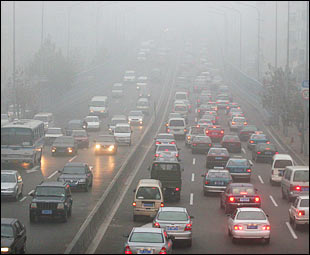The heavy fog that covered areas of China at the weekend resulting in three deaths and countless delays was expected to be dispersed with the arrival of a cold snap last night, the National Meteorological Centre (NMC) said Monday.
The fog first enveloped northeast China's Liaoning Province on Friday and then gradually seeped across north China. Parts of central China and Shandong Province in the east were also affected.
Visibility was less than 200 meters in parts of east China's Shandong and Jiangsu provinces, north China's Beijing and Tianjin municipalities and northeast China's Liaoning Province, the NMC said.
The Beijing Municipal Observatory has issued a yellow fog warning. This is the lowest in the yellow-orange-red scale and the first such warning this winter.
As of noon yesterday more than 100 scheduled flights at Beijing Capital International Airport were delayed due to the heavy fog.
In Liaoning Province traffic-control authorities said that all expressways in and out of the province had remained closed until Sunday afternoon.
The heavy fog caused accidents along the Beijing-Shenyang expressway. Three people were killed and at least 20 seriously injured in several traffic accidents in Liaoning Province at the weekend. The dense fog complicated the rescue work, according to local traffic police office.
Almost 600 long-distance bus trips were cancelled affecting nearly 30,000 travelers in Shenyang, capital of Liaoning Province, yesterday.
In Beijing, sections of six different expressways were closed after thick fog shrouded the capital beginning on Sunday night.
Rail travel was the only form of transportation to benefit from the fog as travelers who weren’t able to move by bus or plane took to the rails, despite the crowds.
Wang Jin, a worker from the Shenyang Railway Station said passenger numbers had increased by about 20 percent at the weekend.
Weather officials attributed the fog to strange weather and environmental conditions.
"The unusually warm winter weather caused the high humidity in the air. And there was hardly any wind. Both factors lead to the dense fog," said Zhang Tao, deputy chief of the local observatory in Shenyang.
Chen Jianhua, an associate professor at the Chinese Research Academy of Environmental Sciences, said that Beijing was hit by a haze rather than fog. Fog is mostly humidity whereas haze can include dust, smoke and other pollution. Increasing volumes of air pollution caused by the start of the winter heating season had exacerbated the foggy conditions, Chen explained.
The local environment protection bureau in Beijing described the air quality yesterday as medium-level polluted on its website. Chen said the Pearl River Delta, Yangtze River Delta, the Basin of Sichuan and north China are vulnerable to winter haze.
The haze has also caused a spike in health problems with many hospitals in Beijing yesterday reporting sharp increases in the number of patients complaining about respiratory problems.
Yu Hongxia, a doctor of respiratory diseases at the China-Japan Friendship Hospital in Chaoyang District, said she had noted a sudden jump in the number of respiratory cases climbing from a daily average of about 150 to almost 200.
(China Daily November 21, 2006)


